Our production has dropped by half and we have fired nearly 10 people who worked on the farm,” laments Fontil Durand, the manager of the company’s production sites
Dominique Charles Jean, a former employee of Haiti Broilers, wanted to contribute to the revival of egg and broiler production through his company “La Petite Ferme”.
“Haiti Broilers” — which at one time accounted for 40% of local egg consumption — stopped its operations in 2022.
The company recorded consecutive losses since 2019, revealed its former director to AyiboPost.
At the start of 2024, Jean’s La Petite Ferme had around 18,000 laying hens producing around 200,000 eggs monthly.
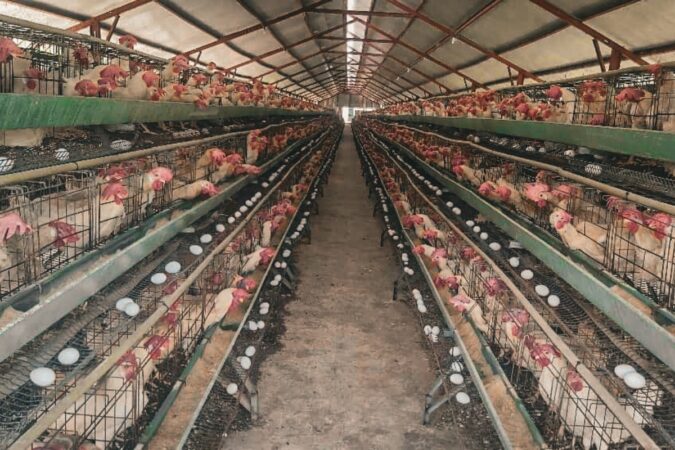
Laying hens at the Petite Ferme site in Lison. This production site is now closed, since the second half of 2023. © Fontil Durand.
But successive waves of insecurity, rising Haitian customs tariffs, and “unfair” competition with Dominican production are jeopardizing the activities of this Port-au-Prince based company.
“Our production has dropped by half and we have fired nearly 10 people who worked on the farm,” laments Fontil Durand, the manager of the company’s production sites.
Jean’s La Petite Ferme had around 18,000 laying hens for a production of around 200,000 eggs monthly.
Half a dozen players in the sector report similar difficulties to AyiboPost, against the backdrop of grievances regarding the failure to take local production into account in the Haitian customs system.
Jean’s father began operations at La Petite Ferme in Delmas in 1978 with just 1,000 laying hens and three employees.
Jean inherited the company in 1996.
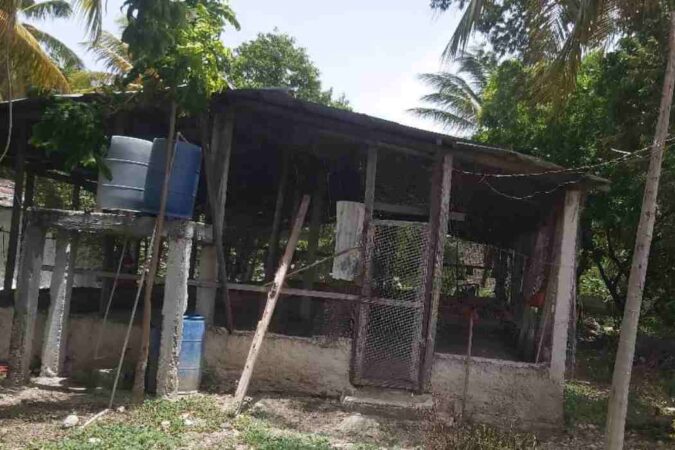
The Petite Ferme sie in Lillavois where the chicks are raised for six months before being transferred to the other locations of the Petite Ferme. © Fontil Durand.
The closure of the border by the Dominicans due to the construction of the Ouanaminthe canal in the second half of 2023 aggravated the company’s situation, which turned to Jamaica to import food for laying hens. The cost of purchase and customs tariffs are higher in this country.
To cover this cost, employees were fired: of more than thirty, only half remain.
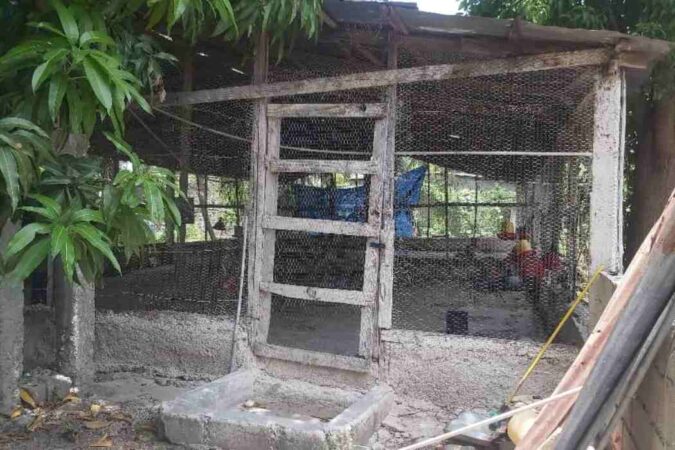
The Petite Ferme site in Lillavois where the chicks are raised for six months before being transferred to the other locations of the Petite Ferme. © Fontil Durand.
Production has also declined. From 200,000 eggs in the first months of 2024, production fell to 108,000 per month today.
Passage fees imposed by gangs on the roads don’t help. From La Plaine to Delmas, the toll has increased from 5,000 to 35,000 gourdes for Petite Ferme drivers since the peak of insecurity at the start of the year.
Passage fees imposed by gangs on the roads don’t help.
On June 14, 2024, almost 20 minutes before speaking with AyiboPost, two heavily armed men got off a motorcycle and burst into the Petite Ferme site in Lillavois to demand a ransom from the agronomist Fontil Durand, manager of the company’s production site.
Twenty minutes later, Durand’s worried voice explains to AyiboPost that, at the end of 2023, nearly 1,000 turkeys intended for slaughter died on the Lison farm because they could not venture there due to the gangs that control virtually the entire locality. “We are abandoned by the State,” he concludes.
Among the Petite Ferme production centers, those of Lison and Bon-Repos have ceased their activities for fear of attacks by armed gangs.
Competition with Dominican production is also a concern.
We are abandoned by the State, he concludes.
Jean tells AyiboPost that eggs imported from the Dominican Republic are a real torment for his business.
“Our low production does not find enough buyers. Apart from those who know the nutritional quality of local eggs, even supermarkets in Port-au-Prince prefer to turn to Dominican production, which is much cheaper for them,” he stresses.
According to Jean, some supermarkets have made it a contractual condition to match the Farm’s products to the more affordable prices of Dominican eggs. A proposal that would put the Farm at a loss.
Even supermarkets in Port-au-Prince prefer to turn to Dominican production, which is much cheaper for them, he stresses.
“It is unreasonable that our eggs are sold at the same price as those of the neighboring country when we spend much more to produce them,” analyzes Jean.
Customs often “surcharges” agricultural inputs, in a situation where exemptions for these local businesses by the organizations concerned are struggling to see the light of day, according to Dominique Charles Jean.
The General Administration of Customs rejects this accusation.
For Jean Ralph Gracia, director of control within the AGD, “customs does not provide exemptions, it is a task that falls to the State via the Ministry of Economy and Finance (MEF), and the applicability of which falls solely to the customs administration.
Other poultry businesses are closing their doors.
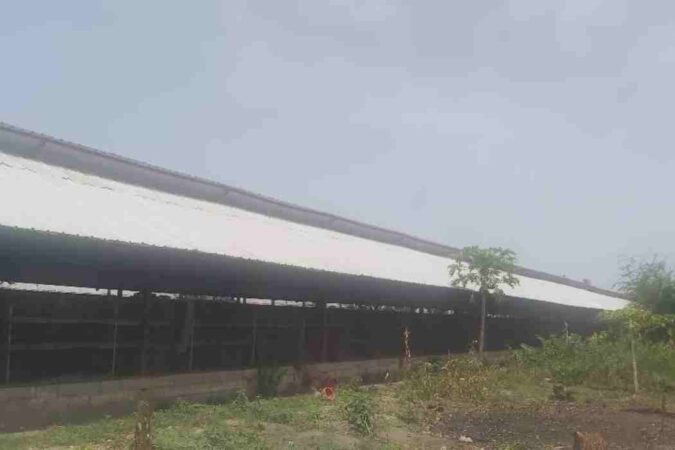
La Petite Farm in Lison. This production site is now closed since the second half of 2023. © Fontil Durand.
La Ferme des Antilles, a modern fully mechanized eggs and broiler production facility, was inaugurated in 2014 in Cavaillon, a few kilometers from the town of Les Cayes.
With 12,000 broilers and a production capacity of 20,000 eggs daily, this “avant-garde” structure intended to help break Haiti’s dependence on eggs from the Dominican Republic.
During “country lockdown” episodes between September and December 2019, the farm recorded enormous losses in laying hens who no longer had enough to eat in the locality of Cavaillon.
Read also: Artibonite: Strong tensions between two localities around 30 tiles of land
Inputs often purchased from the Dominican Republic could not be transported to the commune since the roads of Martissant and Carrefour are blocked by armed bandits.
“We had to liquidate 15,000 hens from different henhouses. Those that were not dead were given away free of charge to individuals or sold cheaply,” adds Myrna Verdier, one of the co-owners.
This family business had to lay off its dozen employees.
Professionals who found a way to feed their families found themselves unemployed overnight.
“Many were unable to find other jobs, others left for the American El Dorado, Canada, Chile, among others,” underscores Verdier. Nearly four years later, Verdier cannot digest this closure: “It’s a total disappointment. Local production is lost. And that’s regrettable.”
When, in 1991, the acquisition of a small property in Gressier welcomed JAVEC Ferme Agricole’s first chickens, the agronomist and entrepreneur Jacques Bontemps would never have thought of ending his activities around 25 years later, with a production which increased from 3,000 to 78,000 hens between 1991 and the 2000s.
It’s a total disappointment. Local production is lost. And that’s regrettable.
This farm, present in Gressier in the West department and in the Petit-Goâve plain, specializes in the production of broiler chickens, poultry feed, and the incubation of chicks, among others.
Breeding cattle for slaughter and producing improved breeds was the last activity the company attempted.
But the absence of competent human resources, the tariffs imposed by Haitian customs, and marketing difficulties strongly linked to insecurity dealt the final blow to the company.
During 2018 to 2019, the breeding of broilers was completely abandoned by the farm.
“The remaining chickens were sold,” confides Bontemps.
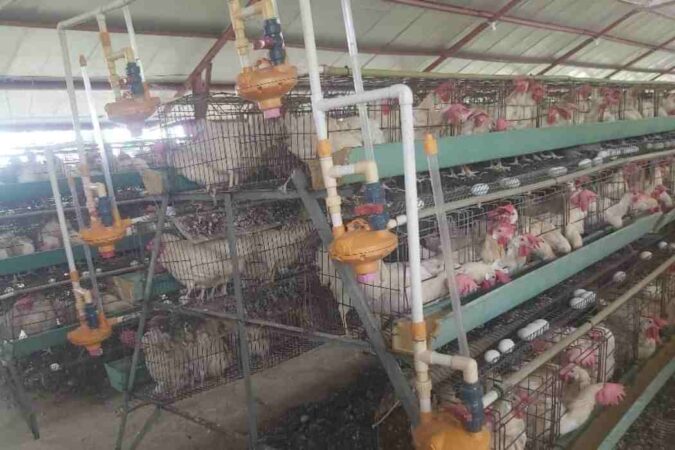
Laying hens at the Petite Ferme in Lison. This production point is now closed, since the second half of 2023. © Fontil Durand.
The Haitian table egg market was already getting 90% of its supply from the Dominican Republic, i.e. around 40 million eggs a month by 2022, according to data from the Asociación Dominicana de Avicultura.
At the beginning of the 1980s, a set of structural adjustment policies described as neoliberal, organized under the control of institutions such as the International Monetary Fund and the World Bank, opened the Haitian market to imports and reduced customs tariffs considerably.
In 1995, customs tariffs were reduced from 40% to 5% on chicken.
Cover image | A poultry farm. ©francebleu
► AyiboPost is dedicated to providing accurate information. If you notice any mistake or error, please inform us at the following address : hey@ayibopost.com
Keep in touch with AyiboPost via:
► Our Channel Telegram : Click here
► Our Channel WhatsApp : Click here
► Our Community WhatsApp : Click here







Comments